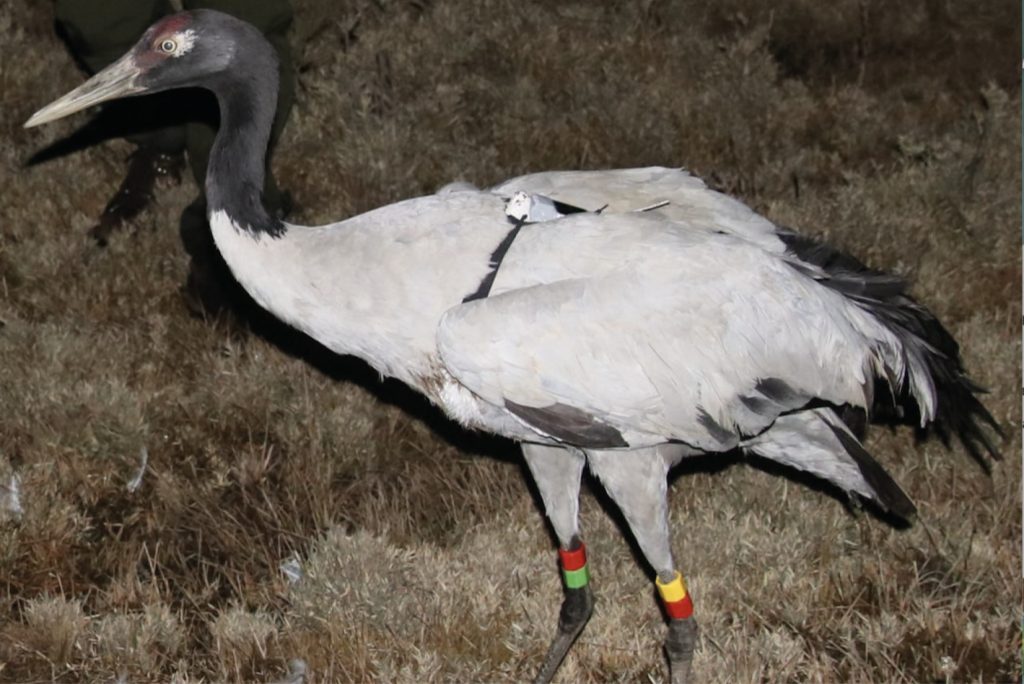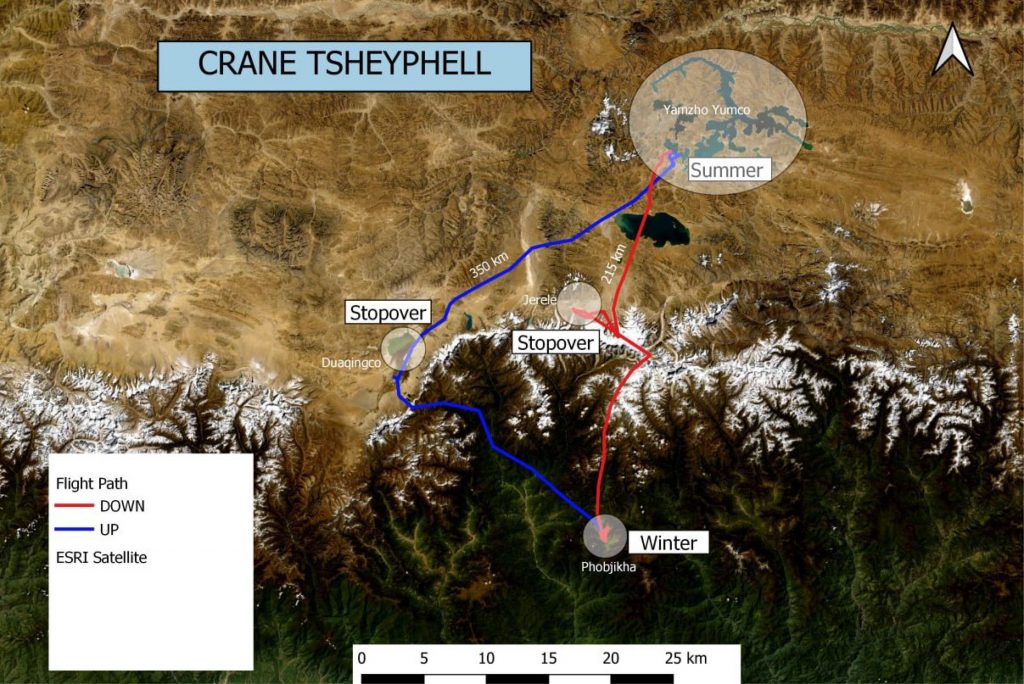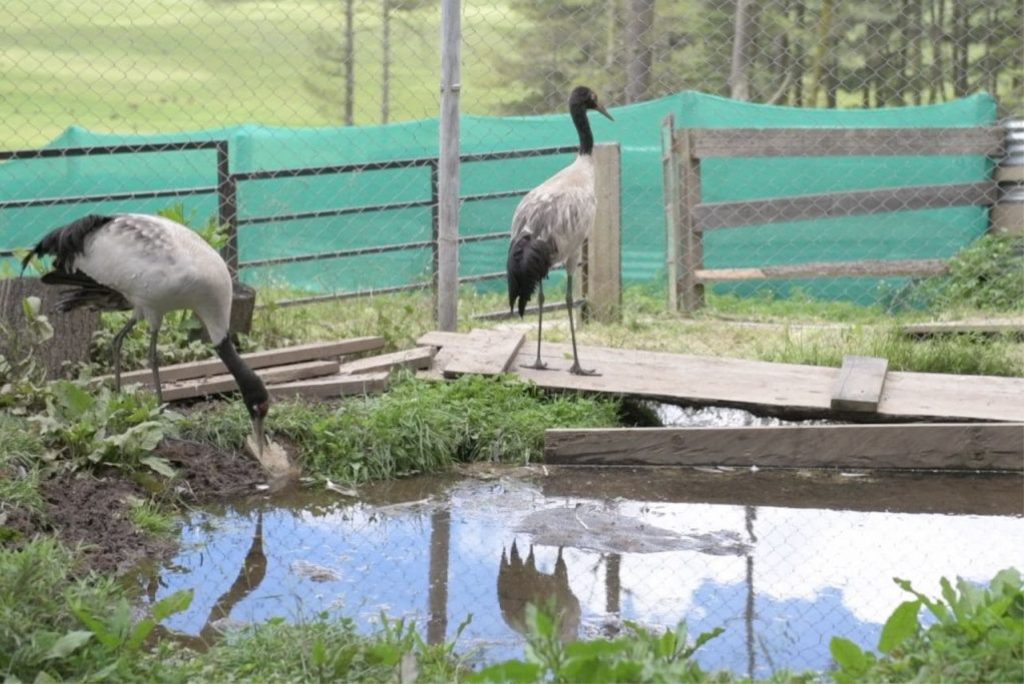After spending 9 months and 12 days in the wetlands of the Tibetan Plateau in China, Crane Tsheyphell is back in the Phobjikha valley for the winter. Tsheyphell left the summer site, Yamcho Yumco, on 8th December, 2023, at around 10:20 AM and reached a place called Jerela at 02:09 PM, located behind the giant Jomolhari peak. The next day, Tsheyphell began his flight at around 8:50AM from Jerela and reached Phobjikha at 11:10 AM. Crane Tsheyphell was tagged with GPRS/GSM transmitter in the winter of 2020 and has been unraveling a lot of stories for us.
This study is conducted by RSPN in partnership with the Department of Forest and Park Services and NABU International with the fund support of the Federal Ministry for the Environment, Nature Conservation, Nuclear Safety and Consumer Protection.As of today, we have counted 473 Black-necked Cranes including 44 juveniles in Phobjikha.


We recently completed expansion of the aviary for #CraneKarma and #CranePema at the Black-necked Crane Education Center, RSPN. This was made possible by the generous financial contribution of Aum Dechen Jamyang, Singye Group. The additional space, along with the inclusion of a swampy area, not only enhances the living conditions for these cranes but also allows them to engage in more natural behaviors, such as foraging for food within the aviary.
The support provided will undoubtedly go a long way in sustaining the efforts of the Black-necked Crane Education Centre in its mission to educate, conserve, and raise awareness about these endangered species. Once again, thank you, Aum Jamyang Dechen, for your significant contribution and for motivating the continued commitment to the well-being of Crane Karma and Crane Pema, as well as the broader goals of environmental education and conservation.



Mr. Niteen Subhash Yeola, Deputy Chief of Mission, Embassy of India in Bhutan India in Bhutan (Embassy of India, Thimphu) called on the Executive Director of RSPN on January 25, 2023, as a follow-up to the meeting held with His Excellency Sudhakar Dalela, Ambassador of India in Bhutan on December 6, 2022.
The Executive Director welcomed DCM to RSPN. During the discussion, Executive Director appraised DCM that RSPN is working on six thematic areas of (a), Species and habitat (b), Wetland and Fresh Water (c), Environmental Education (d), Sustainable Livelihood (e), Waste and Pollution and (f), Climate Change Adaptation and Resilience which are connected and interdependent in nature. ED informed that these six thematic areas are identified based on the National Priorities and also very much aligned to support the Sustainable Development Goals, but the RSPN focus has always been on the conservation of White-bellied Heron (WBH) a Critically Endangered Species and Vulnerable Black-necked Crane (BNC). ED also informed DCM of the recent International Conference on BNC held in Bhutan with all the BNC habitat range countries and discussed common conservation issues, challenges, and the need to harmonize the country-specific action plan. The Bombay Natural History Society Bombay Natural History Society (BNHS), Wildlife Institute of India, Wildlife Institute of India(WII), and World Wildlife Fund World Wildlife Fund India, participated from India in the conference. DCM acknowledged the excellent work done by the RSPN and extended the Indian Embassy, Thimphu, and the Government of India’s goodwill support to RSPN on the conservation of BNC based on the action plan. ED thanked DCM and acknowledged such the highest goodwill and solidarity from His Excellency the Ambassador, Government of India, and expressed appreciation for timely and generous encouragement to RSPN.
Day one:The first day of the two-day International Black-necked Crane (BNC) Conservation Network Meeting happening in Thimphu ended well with a series of knowledge dissemination carried out by researchers of different nations.
The event was graced by the Hon’ble Minister of Agriculture and Forests and Dasho Paljor J. Dorji (Special Advisor to the National Environment Commission Secretariat). The networking meeting is attended by international experts from five countries and relevant national environmental conservation stakeholders and academicians engaged in the study and management of Black-necked Cranes and their habitats.
The objectives of the meeting are:
The meeting is expected to identify important BNC sites, conserved and properly managed at the landscape level with an effective network established. Day one highlighted the knowledge-sharing presentations, conservation actions, and future collaborative actions.
Background:
The Black-necked Crane is the only alpine crane species in the world. Its distribution spreads over different areas in China, Bhutan, and India. Generally, land use change and the loss of wetland habitats are identified as the main threats the species continue to face today.
While there have been little to no transboundary collaborative conservation programs, conservation efforts in the three Range States are important and timely. In many respects, effective results can be achieved through cooperation between the states and civil society actors.
In Bhutan, the Royal Society for the Protection of Nature (RSPN) has a government mandate for the protection of the species and has been working closely with the International Crane Foundation, NABU International, and Crane Conservation Germany.
During the Convention on Migratory Species COP13, held in India, representatives from the range states and international partners of BNC conservation organized a side event to discuss conservation issues related to BNC and requirements for intensified cooperation. The group presented conservation actions in place in each of the range states as well as conservation strategies which require cross-border cooperation. Therefore, this meeting aims to foster international cooperation and maintenance of habitats for the Black-necked Cranes in all its range states.
This meeting is expected to achieve a global action plan for conserving the BNC and the importing sites.
‘The meeting is supported by ICF and Federal Ministry for the environment, nature conservation, nuclear safety and consumer protection (BMUV).




Copyright © 2025 RSPN All Rights Reserved